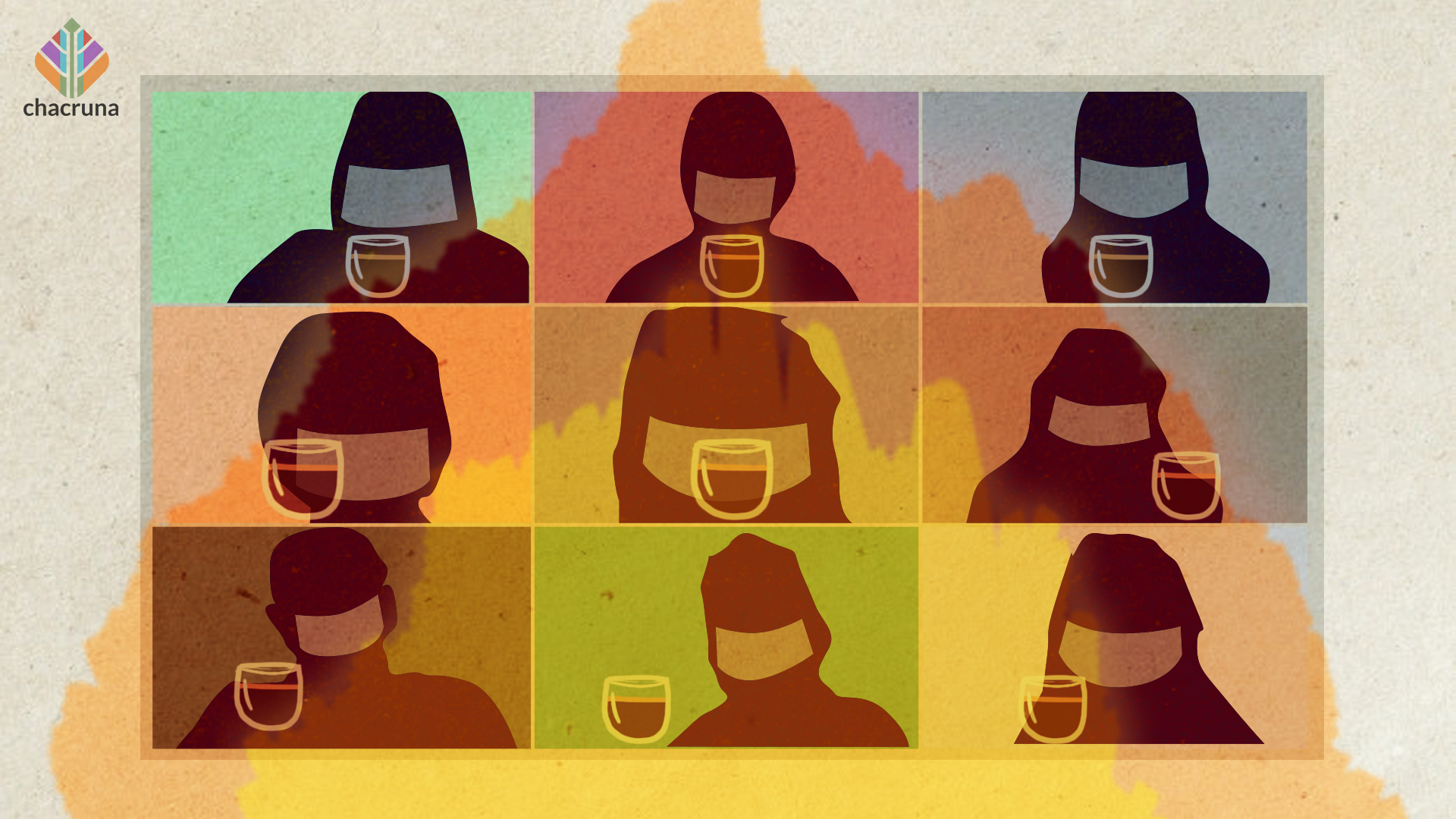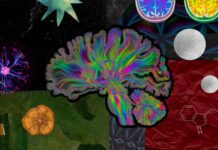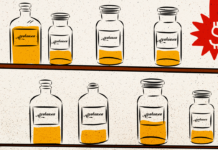- The Emergent Field of Psychedelic Chaplaincy - April 19, 2022
- Preparing Ourselves for the Psychedelic Future with Berra Yazar-Klosinski - November 3, 2021
- Stewarding Psychedelic and Ecological Biospheric Wisdom with Deborah Parrish Snyder - October 13, 2021
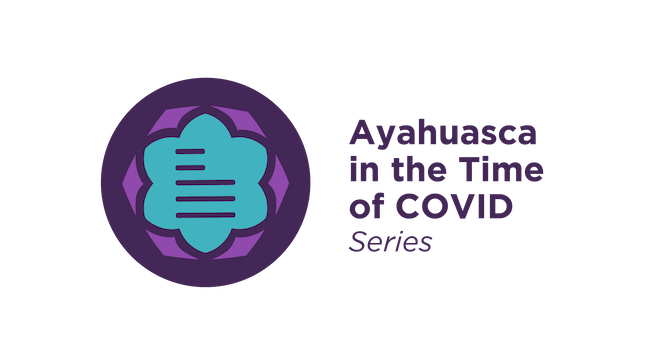
The burgeoning expansion of ayahuasca around the globe has allowed for the evolution of an infinitely diverse array of ayahuasca practices and communities, spanning from Indigenous groups in the Amazon Basin and traditional ayahuasca churches in Brazil to newly evolving neoshamanic traditions in North America, Europe, and beyond. This series will examine how the practices and traditions of these diverse communities are evolving to meet the challenges that have emerged as a result of the global pandemic and the measures taken to mitigate its impact.
The burgeoning expansion of ayahuasca around the globe has allowed for the evolution of an infinitely diverse array of ayahuasca practices and communities, spanning from Indigenous groups in the Amazon Basin and traditional ayahuasca churches in Brazil, to newly evolving neoshamanic traditions in North America, Europe, and beyond. This series will examine how the practices and traditions of these diverse communities are evolving to meet the challenges that have emerged as a result of the global pandemic, and the measures taken to mitigate its impact.
Changing Realities for Brazilian Ayahuasca Churches
This year has been one of catastrophic and catalyzing changes. In a mere matter of months, the sudden arrival of the coronavirus pandemic has forever changed the world as we knew it. Collectively living through an unparalleled situation, everything we have regarded as certain and steadfast is now wavering before us in the wake of uncertainty.
In these challenging times, our increased need for healing and connection is felt by all, and, as such, there is a corresponding increase in demand for ayahuasca ceremonies. As the second of our four-part series, this article takes a look at the effects of the pandemic on the greater ayahuasca community in Brazil, as well as the traditional ayahuasca churches, including the Santo Daime and the União do Vegetal.
The arrival of the pandemic has dramatically changed the landscape for ayahuasca churches and practitioners alike. Luiz Fernando Milanez, a Mestre (leader) in the União do Vegetal (UDV), a syncretic ayahuasca church with more than 18,000 members, shared that the UDV has a medical and scientific department now guiding and supervising its actions. They suspended all sessions (ceremonies) and activities that required face-to-face meetings on March 18.
However, as early as July 4, sessions were once again authorized, providing that there was no legal impediment on the local level and that safety and hygiene standards recommended by health authorities were respected. As of this moment, the UDV is holding ceremonies regularly, although they are not yet receiving any newcomers.
The UDV’s new health and safety protocols include holding sessions in open spaces whenever possible, ensuring social distancing, making face masks mandatory, eliminating communal eating after ceremonies, and allowing members to participate in sessions at their discretion (previously, regular attendance for members was required).
Santo Daime and Barquinha communities are, by comparison, less centralized in their organization and, as a result, locally-established groups have the flexibility to choose whether they hold ceremonies or not. Despite this, most of the large churches representative of Santo Daime traditions have stopped holding ceremonies altogether.
For many Daimistas, this year has been especially challenging because 2020 marks the centenary of one of the most important figures in Daime history, Padrinho Sebastião Mota de Melo, who founded Céu do Mapiá, the biggest Daime community in the world, and was largely responsible for the international expansion of the religion. Many Daimistas had prepared for a year full of celebrations and ceremonies, with plans to go to the Amazon to celebrate this important anniversary.
Glauber Loures de Assis, president of Céu da Divina Estrela, a Brazilian Santo Daime church, and a member of Chacruna’s Ayahuasca Community Committee, shared that he has stopped holding in-person ceremonies altogether. “I do not feel it is safe because, in the middle of the ceremony, when people are experiencing deep and intense experiences, they tend to forget about the pandemic and want to embrace each other, they purge, sneeze, and cough, and we also have to assist those who have difficult experiences in a level of closeness that is risky.”
Loures de Assis has noticed a growing demand for ceremonies since the beginning of the pandemic, noting that “those that have been drinking for many years generally seem to be more prepared to take time off from ceremonies; however, there seems to be increased demand when it comes to newcomers.” He estimates that part of the reason for this is that people feel that ingesting ayahuasca will boost their immune system and serve as a way to protect them against the virus. In addition, ayahuasca offers a way for people to cope with the emotional turmoil activated by the pandemic.
Shifting Practices and Economies of Demand
Since the onset of the pandemic, many of those generating income from conducting ceremonies have had to get creative in finding novel ways to offer services and make money. Despite many of the more established groups refraining from hosting live ceremonies, others have found an opportunity to expand their reach, as well as make money, selling ayahuasca and other medicines of the jungle, including kambô and rapé.
Loures de Assis has seen many new groups and channels that have formed on social media with the sole purpose of commercializing these medicines. “They are selling these in a way that tries to target the masses, advertising ayahuasca that is allegedly enhanced by chromotherapy, music therapy, or crystals,” says Loures de Assis. He adds that they are “selling ayahuasca microdoses, using an image of an Indigenous person that they name ‘Daiminho,’ the ‘little daime,’ when, in fact, they are not related to Daime churches or Indigenous groups in the slightest.”
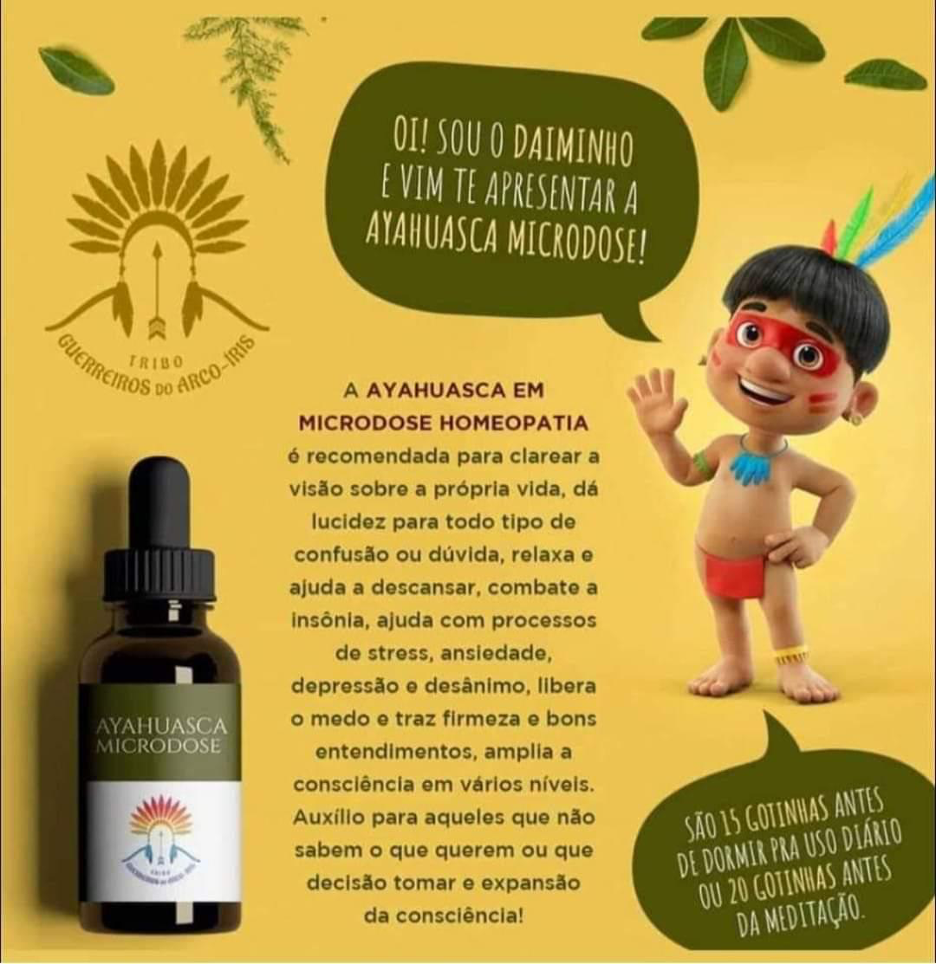
Newly formed ayahuasca centers are capitalizing on the increased demand as well as the fact that few others are offering these services. “Here in Belo Horizonte, I have noticed at least three to four groups that are rather small receiving sometimes up to 30 to 50 people per ceremony because no one else is holding ceremonies,” says Loures de Assis.
Bruno Ramos Gomes, a psychologist researching ayahuasca as a treatment for drug dependence, shared that, “A new thing that I’ve noticed is there are more people selling ayahuasca microdoses on the internet.”
According to Gomes, the sale of ayahuasca microdoses is a relatively new trend, likely influenced by the “hype” that surrounds microdosing psychedelics more generally. Bia Labate, Executive Director of the Chacruna Institute, shared her view following Gomes’ insight, “If it is really true, it would be an interesting phenomenon that, while the South exports ayahuasca to the North, the North exports the concept of microdosing back to the South, expressing a dynamic process of global reinvention of the use of ayahuasca.” Because ayahuasca is legal in Brazil under religious freedom laws, there is considerably more ease surrounding the buying and selling of ayahuasca products, and they are available for purchase on platforms like Facebook and Instagram.
Ayahuasca microdosing is an attractive alternative for less experienced ayahuasca drinkers who don’t have their own pre-established practices and don’t feel safe drinking regular doses by themselves. “The advertising emphasizes that you can get all the benefits of ayahuasca without the risk of hallucination or purging,” says Gomes. “To me, it seems like a way to seduce people and make money off of ayahuasca at a moment when people are unable to attend ceremonies.”
There is even a new social media platform named Daime.Love that was born in the middle of the pandemic as a way to help connect and inform people when and where they could find ceremonies to attend in these trying times. Daime.Love is considered to be controversial within the Daimista community, as it is unrelated to official and well-known Santo Daime groups.
When Prayer Goes Virtual
Just because coronavirus prevents us from gathering together in ceremony, it doesn’t mean we have to forgo the experience altogether. In the Santo Daime church, practitioners have taken to keeping their faith alive through hosting ceremonies virtually through Zoom, and sometimes even streaming them via Instagram and YouTube.
Loures de Assis’s church group, Céu do Divina Estrela, like many other Santo Daime churches, is affiliated with Céu do Mapiá, who have been hosting many virtual ceremonies, as well as permitting their affiliated groups to donate a small quantity of ayahuasca to its members for personal use and shared virtual ceremonies. According to Gomes, who attended some of these virtual rituals, “not everyone was drinking, and what I heard from people is that they were only drinking a little bit to consecrate the medicine together, not to get fully into the experience.”
“We usually start a Zoom meeting, opening the ceremony and having people drink daime at the same time,” says Lourdes de Assis. “We think this is safer because we can check in on people, and if people are having difficult experiences, they can have the support of others. We also have a WhatsApp group where we share prayers, reflections, and texts that we are reading to keep the collective force alive.”
Although virtual ceremonies aren’t ideal, they do serve a purpose in maintaining collective cohesion within groups, providing an important sense of community that people need to get through these hard times. “We feel that this is a safe space to drink ayahuasca because, otherwise, people will start to search for ayahuasca, eventually going to buy it or going to places that are not safe. At the same time, there is something strange about virtual ceremonies, they are not as ‘enchanted’ as being together in the church.”
Similar to the Santo Daime, Milanez said that the UDV hosted virtual discussions and events on important days in the UDV calendar during the peak months of the pandemic. However, the use of technology among the UDV was purely for social and not spiritual meetings. “In the period when we did not have sessions, virtual livestreams were produced by the nuclei (local groups) to maintain contact with the brotherhood. However, we did not drink the ‘tea’ (the name the UDV attributes to ayahuasca) in these meetings.”
Looking to the Future
Thinking about the future of ceremonies, many are skeptical about returning to large in-person gatherings prematurely. Loures de Assis sees sharp divisions within the ayahuasca community at large that are reflected in their stances towards the virus or even potential vaccines. “Many Brazilian ayahuasca drinkers are negationists, not believing in the virus or vaccines,” he says. The lack of consensus on this complicated topic is challenging for ayahuasca drinkers everywhere, and the future of the greater community will be informed by whether these differences are resolved or exacerbated. This trend seems to follow the existing divide between ayahuasca drinkers who support President Bolsonaro and those who do not.
Bia Labate contributed her own view on the subject, “Maybe it’s time to slow down ayahuasca practices and try to understand what this crisis is showing us about our patterns of relationship with nature and with other humans; in any case, these are questions that are very in tune with the medicine itself.”
The future remains unnervingly uncertain, and we are struck by our collective grief for the individuals and the world that we have lost, while simultaneously carrying a seedling of hope in our hearts for the new world that is coming into fruition.
Art by Mariom Luna.
Take a minute to browse our stock:
Did you enjoy reading this article?
Please support Chacruna's work by donating to us. We are an independent organization and we offer free education and advocacy for psychedelic plant medicines. We are a team of dedicated volunteers!
Can you help Chacruna advance cultural understanding around these substances?


